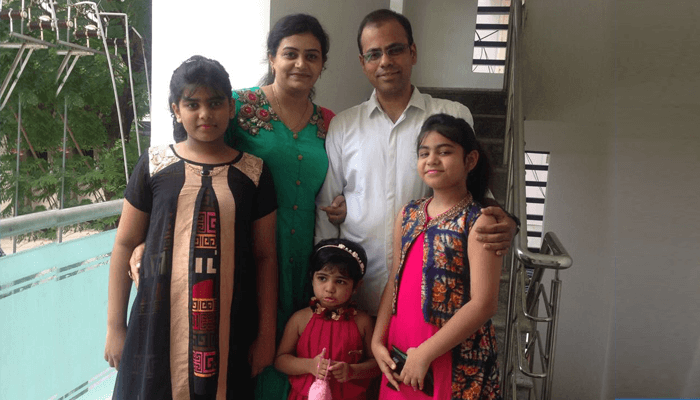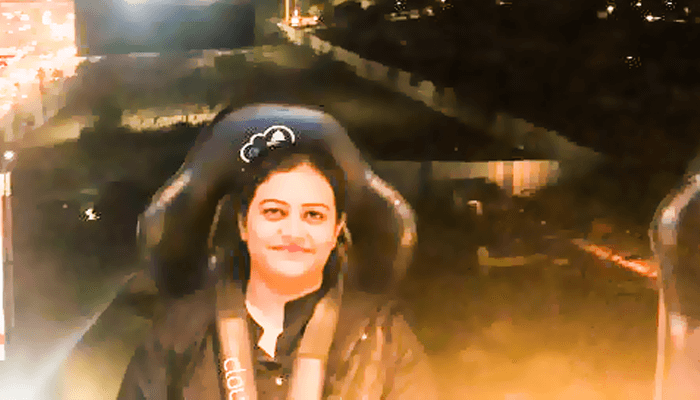Life can often get in the way of individual pursuits. But for Salma Khan who sailed through marriage, childcare, vivas, and then work, her first hiatus came only with the birth of her third child. Her comeback to academia as a PhD aspirant has been nothing short of spectacular. Here, she talks to us about her research that is pending patent approval and other things that make her tick.
When Hyderabad-born and bred Salma Khan tied the matrimonial knot while pursuing her engineering degree, giving academics a backseat was not even an option. “In fact that was one of the conditions under which I got married – that my studies would not be affected,” she says. In testimony to her dedication, the final year saw her appearing for the first semester lab exam and going into labour the next day. “I gave birth to a beautiful baby girl and on the third day, upon discharge from the hospital, went straight to the college to write the next exam,” she exclaims, adding, “If you want to do something badly, you will do it.” Nine days after childbirth, Salma also appeared for her board semester exams which she passed with distinction. It only helped that her husband, Dr. Mohammed Arifuddin Sohel was not only an electronics engineer but faculty at one of the prominent engineering colleges in the city. “He used to sit with me and read out answers for revision,” she recounts gratefully.
College, Children And A Career
With a BTech in hand, Salma enrolled for an MTech degree. A second baby followed shortly. But she seemed unfazed with the additional responsibility. “Studies, kids, and household constraints were going hand-in-hand,” she says. With a strong support system at home, she went on to embrace the teaching profession by joining as a lecturer in her alma mater, the Shadaan College of Engineering. “The faculty there knew me very well and were cognizant of the fact that I continued my academic exploits even after matrimony and childbirth. Plus, I was looking for a little flexibility in the work hours,” she explains. Her professional juggernaut however rolled to a stop with the birth of her third daughter. “I didn’t have my usual support at home then and decided to take a break.” The two-year pause afforded her ample time to reflect upon and decide her next course of action. With her husband, who she fondly calls her “pillar of strength”, egging her on, a hesitant Salma applied for a PhD at IIITH. At the interview, she was advised to test the waters by taking a few courses through the Post Graduate Student Status Program (PGSSP) before plunging headlong into a PhD. “It made sense since I was getting back after a break and running low on self-confidence,” she avers.
A PhD Leading To A Patent
“I’m not going to lie; the first semester at the institute was very very difficult,” she says. For someone who was used to setting her own pace for the day, the new routine was demanding and challenging all at once. But as she signed up for more and more individual courses, things began to fall into place and she soon formally enrolled into the PhD programme at the Center for VLSI and Embedded Systems (CVEST) under Dr. Syed Azeemuddin. “To be honest, at first I wasn’t confident that she could come up to the level of a PhD. We first worked with her for a year, saw her devoting all her energies to the (PGSSP) and then admitted her,” admits Dr. Syed.
According to the professor, Salma was quick to discover the potential in one of the past research works on Integrated Circuit (IC) design done under him and began working on efficient techniques to make the chips more secure. “Salma picked up the existing research and took it to a new level where for the first time a design which was not thought of earlier has been implemented by her,” he says. She has been designing CMOS proteretic circuits which can be used to replace the conventional hysteretic circuits in applications like Analog to Digital converters, Integrated Power management circuits, sensor chips and so on. “Prof. Syed had previously applied this to the Photonics domain. He encouraged me to implement this technique for circuits which greatly improves their speed,” she says. In the next phase of her research, she went on to design a switch using hysteretic and proteretic circuits that can lock circuit designs and be used for securing hardware. “The application is so novel that it is under process for patent filing,” she states.
Behind Every Successful Woman..
With three research papers presented at international conferences plus the impending patent, Salma says that she’s in “a happy place”. But she hastens to clarify that it hasn’t always been like this. “There were times when I wanted to quit. Especially early this year. In research, while you can ask for guidance, ultimately you have to find your own answers. And since it was an entirely new area, it was all the more difficult for me!” It was the professor who told her to believe in herself first before seeking validation from others. Salma’s husband stood by her through her despondency, asking her not to overthink, and instead pausing to let inspiration strike. “My daughters too have gone the extra mile, pitching in wherever needed. My entire family’s efforts behind my endeavour has made the process that much sweeter,” she smiles. Crediting her husband with the right vision for her own career trajectory, she says with pride, “Behind every successful man, they say it’s a woman, but in my case, I owe my success to my husband.”

Grit, Guidance And Grace
As a living example of the adage, “If you can dream it, you can do it”, Salma avers that determination is a must. “And it need not necessarily be there only for academic exploits but for anything that brings you satisfaction,” she says. The other secret sauce she swears by is the support extended by one’s immediate family. “With the right kind of backing, the sky is the limit”. Calling herself “just a simple girl” surrounded by the right kind of people and situations, she reiterates that things moved easily for her thanks to her determination. The other attribute that has worked in her favour is her positivity. “I have always accepted whatever comes my way with grace. If I don’t get anything I crave for despite my best efforts, I move on by reasoning that it was perhaps never meant to be,” she says philosophically. In fact quiz her on what next after the PhD and she responds that she’ll choose from whatever options unfold – either a research or an industry calling. For now though, it has been a long journey and she would like to bask in the moment.



